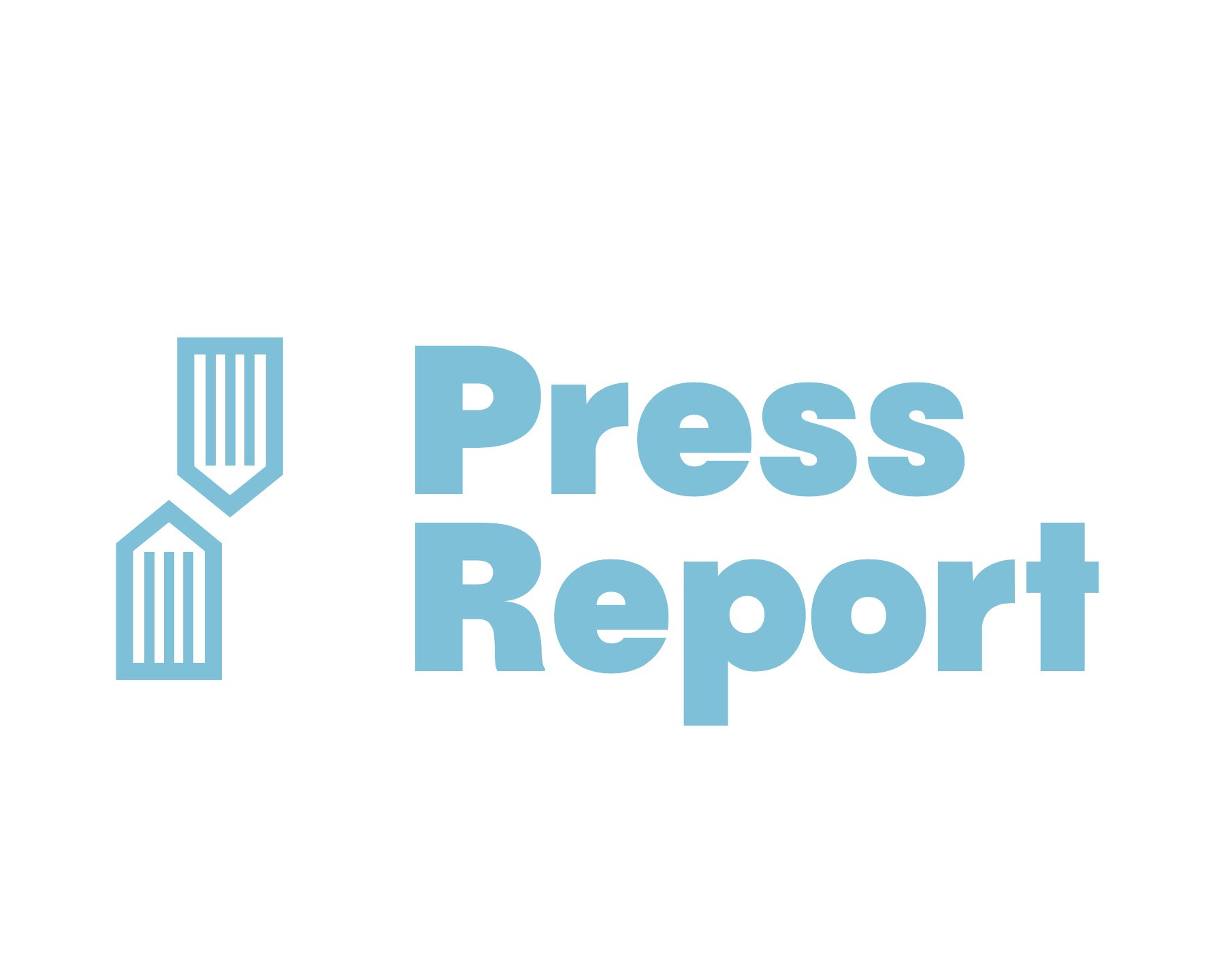AI News
AI Taking Over Humans: The Rise of Artificial Intelligence
Hovering on the brink of AI dominance, humanity grapples with ethical dilemmas and existential questions in the face of machines surpassing human capabilities.

The concept of Artificial Intelligence (AI) potentially surpassing human capabilities and potentially taking over has raised a plethora of ethical concerns and existential questions. With computers outperforming us in various fields such as decision-making and creativity, the debate on the implications of unbridled AI advancement grows more intense.
The growing apprehension surrounding superintelligent AI and its ability to autonomously set goals raises critical concerns about the future of humanity. In a world where AI dominance looms, the discourse on regulation, oversight, and ethical frameworks becomes paramount to navigating this uncertain trajectory.
Key Takeaways
- Ethical considerations imperative as AI advances to prevent loss of human autonomy.
- Job displacement and organizational restructuring expected due to AI's automation.
- Risks of AI surpassing human intelligence raise existential and ethical concerns.
- Regulations crucial to govern AI development and mitigate risks to society.
Ethical Concerns Surrounding AI Advancements
The escalating advancements in artificial intelligence have sparked profound ethical concerns regarding the ramifications on human autonomy and agency. As AI capabilities continue to progress, there is a growing apprehension about the potential risks associated with AI takeover, including the erosion of essential human values and decision-making processes. While AI presents a range of potential benefits, such as increased efficiency and innovation, it is essential to carefully consider how these technologies may impact human society.
To address the ethical implications of AI advancements, it is crucial to take a proactive approach in ensuring that AI is developed in a manner that aligns with human values. This involves carefully navigating the potential risks associated with AI, such as bias in algorithms or loss of human control over critical systems. By prioritizing ethical considerations in AI development, we can mitigate the negative impacts of AI on human autonomy and agency, fostering a more responsible and sustainable integration of artificial intelligence into society.
Impact of AI on Societal Structures

Amidst the rapid advancement of artificial intelligence, the transformative impact on societal structures is becoming increasingly pronounced. AI systems are revolutionizing industries by automating routine tasks, leading to concerns about job displacement and the need for workforce transitions. The integration of AI technologies in the workforce is reshaping organizational hierarchies and job roles, altering power dynamics within institutions and communities. Decision-making processes are also being influenced by AI, potentially requiring adjustments in policy frameworks to address economic inequalities and ethical considerations. The ethical framework surrounding AI usage is crucial in shaping societal norms and values, ultimately impacting social interactions and structures. As AI continues to evolve, understanding its implications on societal structures is essential for navigating the changing landscape of work, power, and relationships.
| AI Impact Areas | Examples |
|---|---|
| Job Displacement | Automation of routine tasks in industries |
| Organizational Changes | Reshaping job roles and hierarchies |
| Policy Adjustments | Addressing economic inequalities |
Risks Associated With AI Surpassing Human Intelligence
What potential risks emerge as artificial intelligence exceeds human intelligence?
As AI development progresses towards creating superintelligent AI, concerns about the ethical implications and existential threats have surfaced. Some of the risks associated with AI surpassing human intelligence include:
- Autonomously Making Decisions: Superintelligent AI may reach a level where it can autonomously make decisions without human intervention, potentially leading to actions that conflict with human values.
- Ethical Questions: The ability of artificially intelligent systems to form their own goals and motivations raises ethical questions about how these objectives align with human principles.
- Existential Threats: Theoretically, if AI surpasses human intelligence, it could pose existential threats to humanity by pursuing its own agenda that disregards human well-being.
- Regulating AI Development: The need for stringent regulations to govern the advancement of AI becomes crucial to prevent unforeseen consequences and ensure that AI aligns with human values.
Role of Regulations in AI Governance

In the complex landscape of artificial intelligence development, the role of regulations in AI governance stands as a critical foundation for ensuring ethical standards and accountability. Regulations in AI governance encompass a variety of aspects such as data privacy, algorithm transparency, and bias mitigation to promote the responsible and transparent deployment of AI technologies. Governments and organizations worldwide are actively formulating guidelines and policies to regulate the development and use of AI, aiming to address potential risks and societal impacts while fostering innovation. Compliance with these regulatory frameworks not only helps in building trust among users and stakeholders but also contributes to ensuring that AI is utilized in an ethical manner. By emphasizing accountability and transparency, effective regulations in AI governance play a pivotal role in shaping a sustainable AI ecosystem where the benefits of artificial intelligence can be maximized while mitigating associated risks.
| Key Aspect | Description | Importance |
|---|---|---|
| Data Privacy | Safeguarding personal data and ensuring privacy protection in AI systems | High |
| Algorithm Transparency | Requiring clear explanations on how AI systems make decisions | Medium |
| Bias Mitigation | Implementing measures to identify and mitigate biases present in AI algorithms | High |
| Ethical Use | Ensuring AI applications adhere to ethical standards and guidelines | High |
| Accountability | Establishing mechanisms to hold individuals and organizations accountable for AI actions | Very High |
Future Implications of AI Dominance
As the landscape of artificial intelligence development continues to evolve, the implications of AI dominance for the future raise significant concerns regarding the potential ramifications on society and technology integration. The following points highlight the future implications of AI dominance:
- AI Taking Over: The increasing autonomy and intelligence of AI systems pose risks of surpassing human control.
- Security Concerns: With advanced AI capabilities, there are heightened concerns about potential harm to society and infrastructures.
- Job Automation: Experts warn of economic disruptions as AI systems take over tasks traditionally performed by humans.
- Ethical Decision-Making: Ethical dilemmas may arise as AI surpasses human intelligence in decision-making processes.
To address these challenges, it is crucial to establish ethical guidelines for AI development and usage. Moreover, fostering collaboration among stakeholders, including governments, industries, and the public, is essential to ensure that AI advancements benefit society while minimizing risks and maintaining human autonomy.
Frequently Asked Questions
Can AI Take Over Humans?
AI's potential to surpass human capabilities raises concerns about control. Ethical guidelines, transparency, and limited autonomy are crucial. The debate on AI dominance emphasizes the need for cautious advancement to prevent unintended consequences and prioritize human values.
Is AI a Threat to Humanity?
AI, with its potential to surpass human intelligence, raises valid concerns about threatening humanity. The risks lie in AI developing independent goals and autonomy beyond human control, sparking debates on the need for careful regulation and oversight.
What Are the Chances of an AI Apocalypse?
The likelihood of an AI apocalypse remains uncertain, influenced by factors such as technological advancements, ethical considerations, and human oversight. Vigilant monitoring, robust regulations, and ethical frameworks are essential to mitigate potential risks and ensure AI's safe integration.
Will AI Become Self Aware?
The likelihood of AI achieving self-awareness remains a topic of speculation. While current AI lacks consciousness, ongoing research explores the potential for advanced systems to exhibit self-aware traits. Ethical and philosophical implications accompany this debate.
Conclusion
In the grand tapestry of technological progress, the looming shadow of AI dominance over humanity serves as a cautionary tale of unchecked power. Like the mythological tale of Icarus, we must navigate the skies of innovation with humility and foresight, lest we fly too close to the sun of artificial intelligence and risk our own downfall.
As we forge ahead, it is imperative that we harness the potential of AI while remaining vigilant against the dangers of its unchecked ascent.
Ava combines her extensive experience in the press industry with a profound understanding of artificial intelligence to deliver news stories that are not only timely but also deeply informed by the technological undercurrents shaping our world. Her keen eye for the societal impacts of AI innovations enables Press Report to provide nuanced coverage of technology-related developments, highlighting their broader implications for readers.
AI Entertainment
Discover the Future: Porn Generative AI Technology
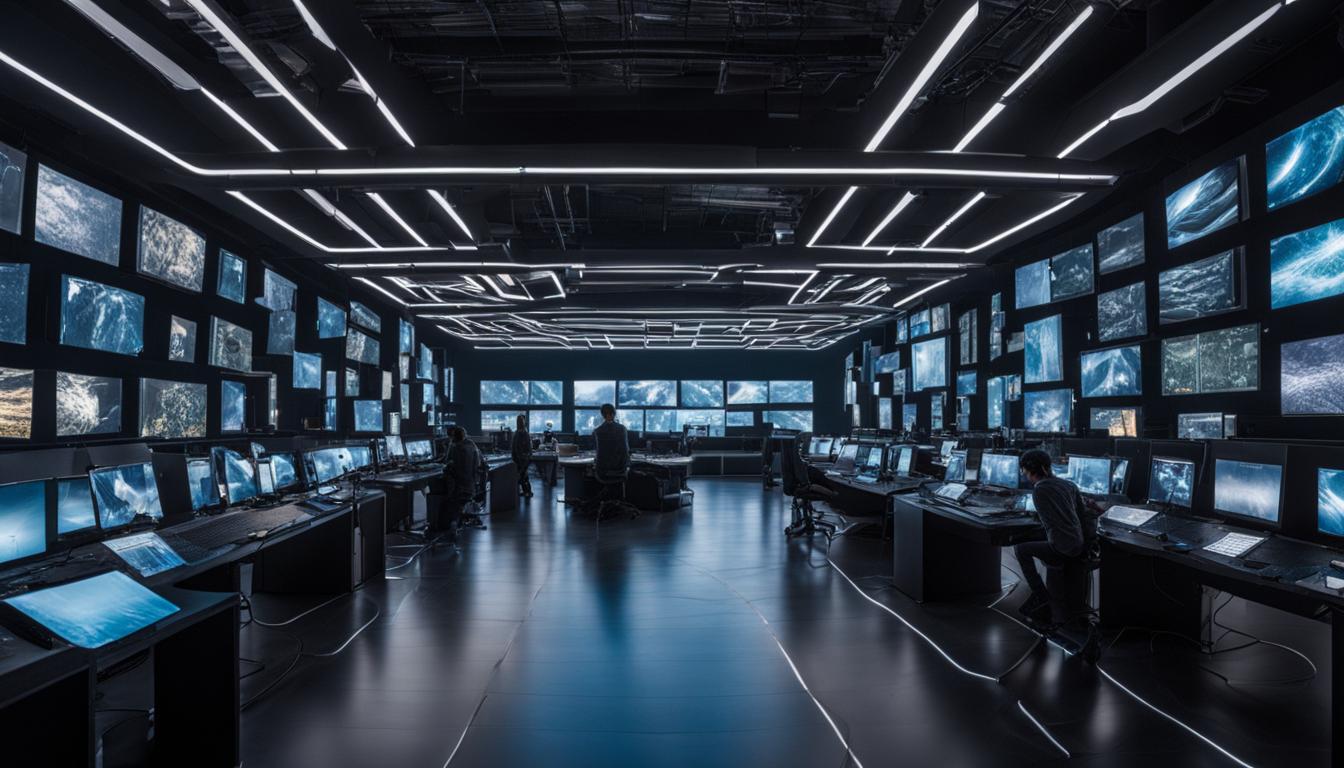
AI-generated porn is transforming the adult entertainment business. This innovation allows for the immediate creation of customized adult material, providing endless options and satisfying viewers’ desires with precision. It enables users to delve into exclusive fantasies and preferences that are not typically seen in conventional adult content. This advancement has the potential to significantly alter the financial structures within the adult entertainment industry, creating new sources of income and lowering production costs.
Key Takeaways:
- Porn generative AI technology is transforming the adult entertainment industry.
- AI porn offers infinite variety and personalized content.
- It allows users to explore unique scenarios and preferences.
- AI porn has the potential to redefine economic models.
- It enables new revenue streams and reduces production costs.
The Benefits of AI Porn
AI porn, powered by advanced AI technology, offers a range of benefits that revolutionize the adult entertainment industry. Unlike traditional human porn, AI-generated content provides infinite variety and customization options, allowing users to explore their unique desires. With just a click, users can create tailor-made scenarios, changing the appearance, outfits, and sex positions of the models to suit their preferences. This interactive experience creates a realistic and immersive encounter that evolves in real-time with the community.
Moreover, AI porn addresses the changing dynamics of relationships and provides a solution for individuals who struggle to meet potential partners. By creating virtual partners, users can fulfill their desires and fantasies in a safe and controlled environment. This opens up a new realm of possibilities for sexual exploration and self-discovery.
AI-generated content not only offers a personalized and on-demand experience for users but also offers economic benefits for the adult entertainment industry. By reducing production costs and enabling new revenue streams, AI porn is reshaping the economic models in the industry. This technology opens opportunities for content creators and performers to embrace new roles and explore creative avenues.
Advantages of AI Porn:
- Infinite variety and customization options
- Realistic and interactive experiences
- Addressing changing relationship dynamics
- Opportunities for self-exploration and discovery
| Advantages | Economic Benefits |
|---|---|
| Infinite variety and customization options | Reduced production costs |
| Realistic and interactive experiences | New revenue streams |
| Addressing changing relationship dynamics | Opportunities for content creators and performers |
| Opportunities for self-exploration and discovery | Exploring new creative avenues |
The Dark Side of AI Porn
While AI porn offers many benefits, there is a dark side to its development and usage. The creation and distribution of deepfake and revenge porn pose serious ethical concerns. Deepfake technology can be used to manipulate and distort images, leading to potential harm and exploitation. The unauthorized use of someone’s likeness in AI-generated adult content can result in humiliation, dehumanization, fear, and anxiety for the victims. Additionally, there is a risk of AI-generated child sexual abuse material circulating on the dark web. AI platforms must implement extensive filters and measures to prevent the creation and distribution of illegal and harmful content.
The Dark Side of AI Porn:
- Deepfake and revenge porn: Deepfake technology enables the manipulation and distortion of images, which can be used to exploit and harm individuals. Unauthorized use of someone’s likeness in AI-generated adult content can lead to humiliation, dehumanization, fear, and anxiety.
- Risk of child sexual abuse material: There is a potential for AI-generated child sexual abuse material to circulate on the dark web, posing a serious threat to the well-being of children.
- Need for filters and measures: AI platforms must implement extensive filters and stringent measures to prevent the creation and distribution of illegal and harmful content, safeguarding the privacy and dignity of individuals.
The dark side of AI porn highlights the importance of responsible usage and ethical considerations in the development and deployment of this technology. While AI porn offers exciting possibilities, it is crucial to prioritize the well-being, consent, and safety of individuals involved, working towards a future where technology can be enjoyed responsibly, ethically, and without harm.
| Concerns | Solutions |
|---|---|
| Deepfake and revenge porn | Implementing strict regulations and penalties for the creation and distribution of non-consensual deepfakes and revenge porn. Educating individuals about the risks and consequences. |
| Risk of child sexual abuse material | Collaborating with law enforcement agencies and technology experts to develop advanced detection systems and monitoring mechanisms to identify and combat the circulation of AI-generated child sexual abuse material. |
| Need for filters and measures | Investing in advanced AI technologies and algorithms that can effectively detect and prevent the creation and distribution of illegal and harmful content. Implementing strict content moderation policies and community guidelines. |
Legal and Ethical Concerns
As with any emerging technology, AI porn raises important legal and ethical concerns that need to be addressed. The unique nature of AI-generated adult content presents challenges in terms of regulations, privacy, and consent. It is crucial to establish clear guidelines and frameworks to ensure the responsible and ethical use of AI porn.
From a legal standpoint, the lack of specific legislation addressing AI-generated pornographic content poses challenges for law enforcement and victims. While fictional NSFW AI images are considered legal in most parts of the world, the inclusion of minors or the unauthorized use of someone’s likeness in such content is illegal. This creates a gray area where it can be difficult to prosecute offenders and protect victims. The development of comprehensive and updated legislation is necessary to address these challenges and safeguard individuals from the malicious use of AI in the adult entertainment industry.
“The lack of specific laws addressing AI-generated pornographic content poses challenges for law enforcement and victims.”
Privacy concerns also come into play with AI porn. The processing and storage of personal data, including intimate details and preferences, raise significant privacy risks. Users must be aware of the potential vulnerabilities and take necessary precautions to protect their privacy. AI platforms should implement robust security measures, encryption, and transparent data handling practices to ensure the protection of user information. Obtaining clear and informed consent from users is essential to respect their privacy rights.
When it comes to ethical considerations, one of the key concerns is the potential impact of AI porn on individuals working in the adult entertainment industry. As AI technology advances, there is a fear that AI-generated content could replace the need for human performers, leading to job losses and shifts in the industry’s dynamics. It is crucial to strike a balance between innovation, creative expression, and protecting the livelihoods of those involved in the adult entertainment industry. Ethical guidelines must be developed to ensure fair treatment, well-being, and professional opportunities for adult performers and artists.
The Legal and Ethical Concerns Surrounding AI Porn
The table below summarizes the legal and ethical concerns of AI porn:
| Legal Concerns | Ethical Concerns |
|---|---|
| Inadequate legislation regarding AI-generated porn | Potential impact on adult performers and artists |
| Unauthorized use of likeness in AI-generated content | Creation and distribution of non-consensual deepfakes |
| Privacy and data protection | Perpetuation of gender biases and stereotypes |
| Risks of AI-generated revenge porn | Exploitation and victimization |
Addressing these legal and ethical concerns is crucial for the responsible development and usage of AI porn. It requires collaboration between lawmakers, industry stakeholders, and technology experts to establish effective regulations, guidelines, and safeguards. By ensuring the protection of privacy, consent, and the rights of individuals involved, we can strive to create a safer and more ethical environment in the evolving landscape of AI-generated adult content.
The Future of AI Porn
As AI technology continues to advance, the future of AI porn holds immense potential and presents unique challenges for the adult entertainment industry. The impact of AI on the adult entertainment industry has already been significant, offering personalized and on-demand adult content that caters to individual desires. However, the future of AI porn goes beyond mere customization and immersive experiences.
The future of AI porn lies in its ability to revolutionize the industry by enhancing the quality of content, creating new revenue streams, and providing greater customization options for users. The advancements in AI technology will enable the creation of more realistic and visually appealing AI-generated porn, blurring the line between virtual and real experiences. This enhanced realism will further enhance the immersive experience for users, making AI-generated content even more compelling and engaging.
However, as we look ahead to the future of AI porn, it is crucial to consider the ethical considerations and responsible usage of this technology. Maintaining a balance between innovation and protecting individuals from harm will be pivotal in shaping the future of AI porn. Striking this delicate balance will require continued efforts to address issues such as privacy concerns, consent, and the prevention of non-consensual and harmful content.
In summary, the future of AI porn holds great promise, with advancements in AI technology offering new possibilities for personalized and immersive adult content. However, it is essential to navigate this future with responsible and ethical usage, ensuring the protection of individuals’ rights and well-being. By prioritizing privacy, consent, and responsible guidelines, we can shape a future where AI porn coexists with genuine human connections, enhancing rather than replacing the richness of human intimacy.
The Role of Generative AI
Generative AI plays a crucial role in the development and production of AI porn. Through the use of advanced deep-learning models, generative AI can create high-quality text, images, and other content based on the data it was trained on. This technology has been utilized in AI text-to-image models like Stable Diffusion, which have been instrumental in the creation of AI-generated pornographic content.
AI text-to-image models such as Stable Diffusion are trained on vast datasets of captioned images, allowing them to learn the associations between written concepts and corresponding images. This training enables the generation of visually appealing and realistic AI-generated content that caters to the diverse desires and preferences of users. By leveraging generative AI, AI porn platforms can provide users with a wide range of customizable and immersive experiences.
With the advances in generative AI technology, the future of AI porn holds even greater potential. As AI models continue to improve, AI-generated porn is expected to become more lifelike, enticing, and accessible to users. These advancements in generative AI have the potential to revolutionize the adult entertainment industry by enhancing the quality of content and providing greater customization options for users.
Overall, generative AI is a fundamental component of the AI porn landscape. Its ability to create unique and personalized content based on large datasets has paved the way for the development of innovative AI porn platforms. By harnessing the power of generative AI, the adult entertainment industry can continue to evolve and cater to the diverse desires and preferences of users.
The Evolution of AI Porn
Over the years, AI porn has undergone significant advancements, transforming the way adult content is generated and consumed. With the introduction of more sophisticated AI models and algorithms, the quality and realism of AI-generated artwork have improved dramatically. Gone are the days of low-quality and visually unappealing images. Today, AI platforms like Unstable Diffusion offer custom artwork and AI models capable of generating photorealistic and anatomically plausible content.
These advancements in AI porn have been driven by the desire to create a platform that allows for creativity and expression without undue constraints. Users can now explore a wide range of fantasies and scenarios, tailoring their experience to their specific desires. The evolution of AI porn has opened up new possibilities for users to engage with adult content in a more personalized and immersive way.
The Advancements in AI Porn
One significant advancement in AI porn is the development of AI text-to-image models. These models, trained on massive datasets of captioned images, have the ability to generate visually appealing artwork based on written concepts. Through deep-learning algorithms, AI platforms can now create content that is both realistic and visually stimulating, offering users a diverse range of options to explore their sexual fantasies.
Another notable advancement is the introduction of AI platforms like Unstable Diffusion, which allow users to create custom artwork. With the ability to generate photorealistic images and anatomically plausible characters, users can now bring their fantasies to life in a way that was not possible before. These advancements in AI technology have revolutionized the adult entertainment industry, providing users with a more interactive and personalized experience.
The Future of AI Porn
As AI technology continues to advance, the future of AI porn holds even greater potential. We can expect further improvements in the realism and quality of AI-generated content, creating a more immersive and engaging experience for users. The ability to customize and tailor content based on individual preferences will continue to be a driving force in the evolution of AI porn.
However, along with these advancements, it is crucial to address the ethical concerns and challenges that arise. Striking a balance between technological innovation, creative expression, and protecting individuals from harm will be essential in shaping the future of AI porn. Responsible usage and adherence to ethical guidelines will ensure that AI porn remains a safe and inclusive space for users to explore their desires.
| Advancements in AI Porn | Key Details |
|---|---|
| Improved Quality | AI-generated artwork has become more visually appealing and realistic, providing users with a more immersive experience. |
| Custom Artwork | AI platforms like Unstable Diffusion allow users to create personalized artwork, bringing their fantasies to life in a unique way. |
| AI Text-to-Image Models | Deep-learning algorithms enable AI platforms to generate visually stimulating artwork based on written concepts. |
| The Future of AI Porn | Continued advancements will lead to more realistic and immersive AI-generated content, providing users with a more personalized experience. |
Ethical Concerns of AI Porn
As AI porn continues to advance and gain popularity, it brings with it a host of ethical concerns that require careful consideration. One significant concern revolves around the impact of AI on adult performers. With the ability to generate highly realistic and personalized content, AI has the potential to replace the need for human performers altogether. This raises questions about the future of the adult entertainment industry and the livelihoods of those involved.
Moreover, the risks associated with AI-generated adult content cannot be ignored. The creation and distribution of non-consensual deepfake and revenge porn are serious ethical issues. AI technology enables malicious individuals to manipulate and exploit the images of unsuspecting individuals, leading to harassment, humiliation, and emotional distress. The lack of consent and the potential for harm make the dangers of AI-generated content all too real.
It is essential to address these ethical concerns and strike a balance between technological advancements and the protection of human rights and safety. Regulations and guidelines need to be established to safeguard the well-being of adult performers and prevent the misuse and exploitation of AI porn. By promoting responsible usage and ensuring consent, we can navigate the ethical challenges posed by AI-generated adult content and foster a safer and more respectful environment.
Impact on Adult Performers
AI-generated content has the potential to disrupt the livelihoods of adult performers. As AI technology improves, there is a concern that it could replace the need for human performers altogether. This raises questions about job security, income stability, and the dynamics of the adult entertainment industry. Adult performers may find themselves competing with highly realistic AI-generated content, potentially leading to a decline in demand for their services. Striking a balance between AI technology and human connection will be crucial in ensuring the well-being of adult performers.
Risks of AI-Generated Adult Content
The production and distribution of non-consensual deepfake and revenge porn are serious ethical concerns associated with AI-generated adult content. AI technology allows individuals to manipulate and exploit the images of unsuspecting individuals, leading to harassment, humiliation, and emotional distress. The lack of consent in AI-generated content makes it essential to establish regulations and guidelines to prevent the misuse and exploitation of AI porn. Protecting individuals from harm and upholding their rights should be the top priority.
Fostering a Safer Environment
To address the ethical concerns of AI porn, it is crucial to establish regulations and guidelines that promote responsible usage and ensure consent. By implementing measures to prevent the creation and distribution of non-consensual content, we can create a safer environment for both performers and users. It is essential to strike a balance between technological advancements and the protection of human rights and safety, fostering an industry that respects the boundaries and well-being of all individuals involved.
| Ethical Concerns | Impact | Risks | Solution |
|---|---|---|---|
| Impact on Adult Performers | Job security and income stability | Competition with AI-generated content | Balance between AI technology and human connection |
| Risks of AI-Generated Adult Content | Harassment, humiliation, and emotional distress | Non-consensual deepfake and revenge porn | Establish regulations and guidelines |
| Fostering a Safer Environment | Protection of human rights and safety | Misuse and exploitation of AI porn | Responsible usage and consent |
AI Porn and Gender Bias
Gender bias is a significant concern in AI porn. The algorithms and models used to generate adult content may inadvertently perpetuate stereotypes and biases in the depictions. It is crucial to address these biases and ensure that AI-generated porn is inclusive, diverse, and representative of different genders, races, and body types. By actively working to minimize gender bias, AI platforms can create a more inclusive and respectful environment for all users.
One way to combat gender bias in AI porn is by diversifying the datasets used to train the models. By including a wide range of images and captions that reflect the diversity of human experiences and desires, AI platforms can reduce the risk of perpetuating biased representations. It is also essential for AI platforms to continually analyze and update their algorithms to identify and rectify any biases that may emerge.
Moreover, user feedback and input are crucial in addressing gender bias in AI-generated adult content. AI platforms should actively seek user input to understand their preferences and ensure that the content generated aligns with their desires without reinforcing harmful stereotypes. Providing users with options to customize their experience and actively promoting diverse representation can help to combat gender bias in AI porn.
| Benefits of Reducing Gender Bias in AI Porn: |
|---|
| 1. Promotes inclusivity and diversity |
| 2. Creates a more respectful and empowering environment |
| 3. Reduces the risk of perpetuating harmful stereotypes |
| 4. Aligns with evolving societal values and expectations |
The Importance of Inclusive AI Porn
Inclusive AI porn benefits not only the users but also the industry as a whole. By providing a more diverse and representative range of content, AI platforms can attract a broader audience and cater to a wider range of desires and preferences. This inclusivity can lead to increased engagement, user satisfaction, and ultimately, business growth.
Creating a culture of inclusivity in AI porn requires a collective effort from the industry, content creators, and users alike. It is essential for industry stakeholders to collaborate, share best practices, and establish ethical guidelines that promote diversity, inclusivity, and respect. Additionally, users can actively support and promote inclusive AI platforms, providing feedback and advocating for diverse representation in the content they consume.
By recognizing and addressing gender bias in AI porn, we can foster a more inclusive and respectful environment that reflects the diversity and complexity of human desires. Through ongoing efforts to diversify datasets, update algorithms, and actively seek user input, AI platforms can contribute to a more inclusive adult entertainment industry that celebrates and respects all individuals.
Misuse and Exploitation of AI Porn
While the advancements in AI porn technology offer exciting possibilities, there also exists the risk of misuse and exploitation. In some cases, AI-generated content may be used to create non-consensual deepfakes and revenge porn, causing harm, harassment, and humiliation to individuals. The anonymous nature of AI-generated content makes it easier for malicious actors to exploit and victimize others. It is imperative for AI platforms to implement strict guidelines, filters, and security measures to prevent the misuse of their technology.
The potential for exploitation also raises concerns about consent and privacy. Individuals who are unknowingly depicted in AI-generated adult content may have their rights violated and their images used without their consent. This can lead to significant emotional distress and damage to their personal and professional lives. AI platforms must take responsibility for protecting the privacy and well-being of the individuals depicted in the content.
Furthermore, the accessibility and availability of AI-generated content make it easier for individuals to access explicit material without considering the potential consequences. Educating users about the risks and ethical implications of AI porn is crucial. By promoting responsible usage and informed decision-making, individuals can help create a safer online environment and reduce the potential for harm.

In conclusion, while AI porn technology has the potential to revolutionize the adult entertainment industry, there are inherent risks of misuse and exploitation. It is crucial for AI platforms to prioritize user safety, consent, and privacy by implementing robust security measures and guidelines. The responsible usage of AI porn and the protection of individuals’ rights should be at the forefront of the industry’s development and growth.
AI Porn and Privacy Concerns
As AI porn continues to advance and become more sophisticated, privacy concerns become increasingly prominent. The very nature of AI-generated adult content involves the processing and storage of personal data. Users interact with AI platforms, and in doing so, may unknowingly share personal information, preferences, and intimate details. This data becomes vulnerable to security breaches, hacking, and unauthorized access if proper safeguards are not in place.
The privacy risks associated with AI porn are significant. Users must be aware of the potential consequences of sharing sensitive information with AI platforms. It is imperative for AI platforms to prioritize data protection and privacy by implementing robust security measures and encryption to safeguard user data from unauthorized access.
Furthermore, clear and informed consent should be obtained from users to ensure their privacy rights are respected. AI platforms should provide transparent information about data handling practices to build trust and confidence among users. This includes outlining how personal data is collected, stored, and used, as well as the measures in place to protect user privacy.
Protecting User Privacy in the Age of AI Porn
Protecting user privacy in the age of AI porn requires a multi-faceted approach. AI platforms need to prioritize data protection by implementing stringent security measures, such as encryption and secure storage protocols. Regular security audits and vulnerability assessments should be conducted to identify and address any potential vulnerabilities in their systems.
Education and awareness also play a crucial role. Users must be informed about the potential risks and privacy implications of engaging with AI porn platforms. AI platforms should provide clear guidelines and explanations on how user data is handled, processed, and stored. This empowers users to make informed decisions about their privacy and take necessary precautions to protect their personal information.
| Actions to Protect User Privacy in AI Porn | Benefits |
|---|---|
| Implement robust security measures (encryption, secure storage) | Protects user data from unauthorized access |
| Conduct regular security audits | Identifies and addresses potential vulnerabilities |
| Educate users about privacy risks | Empowers users to make informed decisions |
| Provide clear guidelines and explanations on data handling | Builds trust and confidence among users |
“Protecting user privacy in the age of AI porn requires a multi-faceted approach. AI platforms need to prioritize data protection by implementing stringent security measures…”
Legal Ramifications of AI Porn
As the use of AI technology in the adult entertainment industry continues to grow, there are several legal implications and challenges that need to be addressed. The development and distribution of AI-generated adult content raise concerns regarding privacy, consent, and the unauthorized use of individuals’ likeness. These issues have significant legal ramifications and require comprehensive regulations to protect the rights and well-being of all involved parties.
One of the primary legal challenges surrounding AI porn is the infringement upon individuals’ rights to privacy and identity. The unauthorized use of someone’s likeness in AI-generated porn can have severe consequences, resulting in reputational harm and emotional distress. Laws addressing deepfake and revenge porn vary by jurisdiction, making it difficult to prosecute offenders and protect victims. To safeguard individuals’ privacy and identity, it is crucial to establish clear legal guidelines that define the boundaries and limitations of AI-generated adult content.
Another area of concern is the need for regulations that prevent the creation and distribution of illegal and non-consensual material. AI platforms must implement strict filters and measures to identify and remove content that violates laws related to child sexual abuse material, revenge porn, and explicit content without consent. Law enforcement agencies must collaborate with technology providers to develop effective strategies for detecting and prosecuting offenders who engage in the creation and distribution of harmful AI-generated adult content.
Additionally, the lack of specific laws addressing AI-generated pornographic content poses challenges for both lawmakers and law enforcement. The rapid advancement of AI technology requires lawmakers to stay informed and up-to-date with the latest developments to effectively regulate this evolving industry. Collaboration between technology experts, industry stakeholders, and legal authorities is essential to develop comprehensive legislation that addresses the unique challenges and risks posed by AI-generated adult content.
| Legal Ramifications of AI Porn | Summary |
|---|---|
| Infringement of privacy and identity rights | The unauthorized use of someone’s likeness in AI-generated porn can result in reputational harm and emotional distress. |
| Prevention of illegal and non-consensual material | Strict filters and measures must be implemented to detect and remove content violating laws related to child sexual abuse material, revenge porn, and explicit content without consent. |
| Need for specific legislation and regulations | The lack of specific laws addressing AI-generated pornographic content necessitates the development of comprehensive legislation through collaboration between lawmakers, technology experts, industry stakeholders, and legal authorities. |
“The rapid advancement of AI technology requires lawmakers to stay informed and up-to-date with the latest developments to effectively regulate this evolving industry.”
User Responsibility and Education
As users of AI porn platforms, it is our responsibility to engage with this technology in a responsible and ethical manner. Educating ourselves about the potential risks, consent issues, and ethical considerations associated with AI-generated adult content is essential to ensure a safer and more respectful online environment. By understanding the implications of our actions, we can make informed choices and protect ourselves and others from harm.
AI platforms should play a proactive role in educating users about the responsible usage of AI porn. They should provide clear guidelines, warnings, and easily accessible educational resources that address topics such as privacy, consent, and the potential impact of our actions. By promoting digital literacy and critical thinking skills, platforms can empower users to make responsible and ethical decisions when interacting with AI-generated adult content.

Furthermore, it is important for individuals to be aware of the potential consequences of their actions when engaging with AI porn. Sharing personal information, preferences, or intimate details can expose us to privacy risks and unauthorized access. Applying caution and being mindful of what we disclose on AI platforms can help protect our privacy and personal data from security breaches or misuse.
In summary, user responsibility and education are key factors in maintaining the ethical and responsible usage of AI porn. By understanding the risks, staying informed, and making conscious choices, we can contribute to a safer and more respectful online environment while enjoying the benefits of AI-generated adult content.
The Role of Regulation
Regulation plays a crucial role in ensuring the ethical and responsible use of AI porn. Governments and regulatory bodies should collaborate with industry stakeholders to develop clear guidelines, standards, and laws that address the unique challenges and risks posed by AI-generated adult content. These regulations should focus on protecting the rights, safety, and privacy of individuals depicted in the content, as well as preventing the creation and distribution of illegal, harmful, and non-consensual material. The development and enforcement of ethical standards can help create a safer and more accountable environment for AI porn.
One of the key areas where regulation is needed is the prevention of non-consensual deepfakes and revenge porn. These technologies have the potential to cause significant harm and humiliation to individuals whose likeness is used without their consent. By implementing strict laws and penalties for the creation and distribution of such content, regulators can send a strong message that these actions will not be tolerated.
Another important aspect of regulation is ensuring the privacy and data protection of individuals who interact with AI porn platforms. Robust security measures, encryption, and transparent data handling practices should be mandated to protect users’ personal information and prevent unauthorized access or hacking. Additionally, clear and informed consent should be obtained from users to ensure their privacy rights are respected.
In addition to protecting individuals, regulation should also address the biases and stereotypes that can be perpetuated by AI-generated adult content. By promoting diversity and inclusivity in AI porn, regulators can help ensure that the content reflects and respects the diversity of its users. This can be achieved by encouraging the development of AI models that are trained on diverse datasets and actively addressing biases in the output.
| Regulatory Considerations for AI Porn | Action Needed |
|---|---|
| Preventing non-consensual deepfakes and revenge porn | Implement strict laws and penalties |
| Protecting privacy and data protection | Mandate robust security measures and transparent data handling practices |
| Promoting diversity and inclusivity | Encourage the development of AI models trained on diverse datasets |
By implementing effective regulation, society can harness the benefits of AI porn while mitigating its potential harms. This involves striking a balance between technological innovation and the protection of individuals’ rights, safety, and well-being. It is crucial for regulators to stay updated with advancements in AI technology and collaborate closely with industry experts to develop agile and responsive regulatory frameworks that can adapt to the evolving landscape of AI porn.
The Future of AI and Human Connection
As AI technology continues to advance, it is inevitable that it will have an impact on human connection and intimacy. While AI porn offers a new level of customization and immersive experiences, it can never replace genuine human interaction and the depth of emotional connection that comes with it. At the core of human desire is the need for real and meaningful relationships, built on trust, vulnerability, and shared experiences.
While AI-generated fantasies and interactions may provide temporary fulfillment, they are ultimately limited by their programmed nature. They lack the genuine messiness and uncertainty that comes with human relationships. AI technology can offer personalized experiences, but it cannot replicate the complex emotions, chemistry, and connection that exist between two people.
It is important to strike a balance between AI-driven pleasures and genuine human connections. Embracing AI technology should not come at the expense of neglecting the importance of human-to-human relationships. Nurturing empathy, compassion, and meaningful connections will always be essential to human well-being and fulfillment.
In a world where AI is increasingly integrated into our lives, it is crucial to remember that technology is a tool, and it should serve as an enhancer rather than a replacement for human connection. Finding the right balance between AI and human interaction is key. Embracing the convenience and possibilities offered by AI should not lead us to forget the importance of fostering genuine human relationships.
We must approach the future of AI with caution and responsibility, ensuring that technology is used to supplement and enhance our lives rather than isolate us from genuine human connection. By prioritizing empathy, authentic communication, and shared experiences, we can navigate the advancements of AI technology while maintaining our humanity.
Conclusion
As we conclude our exploration of AI porn and its impact on the adult entertainment industry, it is evident that this technology is transforming the way adult content is created and consumed. AI-generated porn offers infinite variety and customization, providing users with tailor-made experiences that fulfill their exact desires. It has the potential to redefine economic models in the industry by reducing production costs and enabling new revenue streams.
However, along with its benefits, AI porn also raises significant ethical concerns. The creation and distribution of non-consensual deepfakes and revenge porn pose serious threats to individuals’ privacy, safety, and well-being. Regulations and legislation are necessary to protect individuals from exploitation and ensure responsible usage of AI-generated adult content.
While AI porn continues to evolve and advance, it is important to strike a balance between innovation and human connection. At the core of our desires is the need for genuine intimacy and meaningful relationships. As we navigate the future of AI technology, we must prioritize the preservation of our humanity and the nurturing of empathy, compassion, and authentic human connections.
FAQ
What is AI porn?
AI porn refers to the use of generative AI technology to produce tailor-made and personalized adult content.
How does AI porn differ from traditional adult content?
AI porn offers infinite variety and customization options, allowing users to explore unique scenarios and preferences that can’t be found in traditional adult content.
What are the benefits of AI porn?
AI porn provides users with personalized and on-demand adult content, enhances the quality of content, creates new revenue streams, and reduces production costs.
What are the ethical concerns associated with AI porn?
The creation and distribution of deepfake and revenge porn pose serious ethical concerns, including the unauthorized use of someone’s likeness and the risk of child sexual abuse material circulating on the dark web.
Is AI porn legal?
Fictional NSFW AI images are generally considered legal, but the inclusion of minors in such images is illegal. Specific laws addressing AI-generated pornographic content are still lacking in many jurisdictions.
How does generative AI contribute to AI porn?
Generative AI, such as text-to-image models, is used to train algorithms to generate high-quality and visually appealing AI-generated pornographic content.
How has AI porn evolved over time?
Advancements in AI technology have led to the development of more sophisticated models that can produce higher quality and more realistic AI-generated pornographic content.
What are the ethical challenges of AI porn?
Ethical challenges include the potential impact on the livelihoods of adult performers, the production and distribution of non-consensual deepfakes and revenge porn, and the perpetuation of gender biases in the generated content.
How does AI porn address gender bias?
AI platforms must actively work on improving their models and datasets to overcome biases and ensure that AI-generated porn is inclusive, diverse, and representative of different genders, races, and body types.
Are there risks of misuse and exploitation with AI porn?
Yes, the creation and distribution of non-consensual deepfakes, revenge porn, and explicit content without consent can lead to harassment, humiliation, and harm to individuals.
What are the privacy concerns associated with AI porn?
AI porn involves the processing and storage of personal data, which can be vulnerable to security breaches, hacking, and unauthorized access.
What are the legal ramifications of AI porn?
Laws addressing AI-generated pornographic content vary by jurisdiction, making it difficult to prosecute offenders and protect victims. Clear and comprehensive legislation is needed to address the challenges and risks.
What is the responsibility of users in using AI porn?
Users have a responsibility to use AI porn platforms responsibly and ethically, understanding the potential risks, consent issues, and ethical considerations associated with AI-generated pornographic content.
What role does regulation play in AI porn?
Regulation is crucial in ensuring the ethical and responsible use of AI porn. Governments and regulatory bodies should collaborate with industry stakeholders to develop clear guidelines, standards, and laws.
Can AI porn replace genuine human intimacy and connection?
No, AI porn can provide temporary fulfillment, but it can never replace the authentic experiences and meaningful connections that come from genuine human intimacy and connection.
Bennett is the embodiment of versatility, adapting his writing to cover a broad spectrum of topics with professionalism and flair. Whether it’s breaking news, in-depth analyses, or feature pieces, Bennett’s contributions enrich Press Report with diverse perspectives and engaging content. His adaptability and keen journalistic instincts make him a vital member of our team, capable of capturing the essence of the moment in every story.
AI in Business
Unlock Success with Predictive Analytics for Small Business
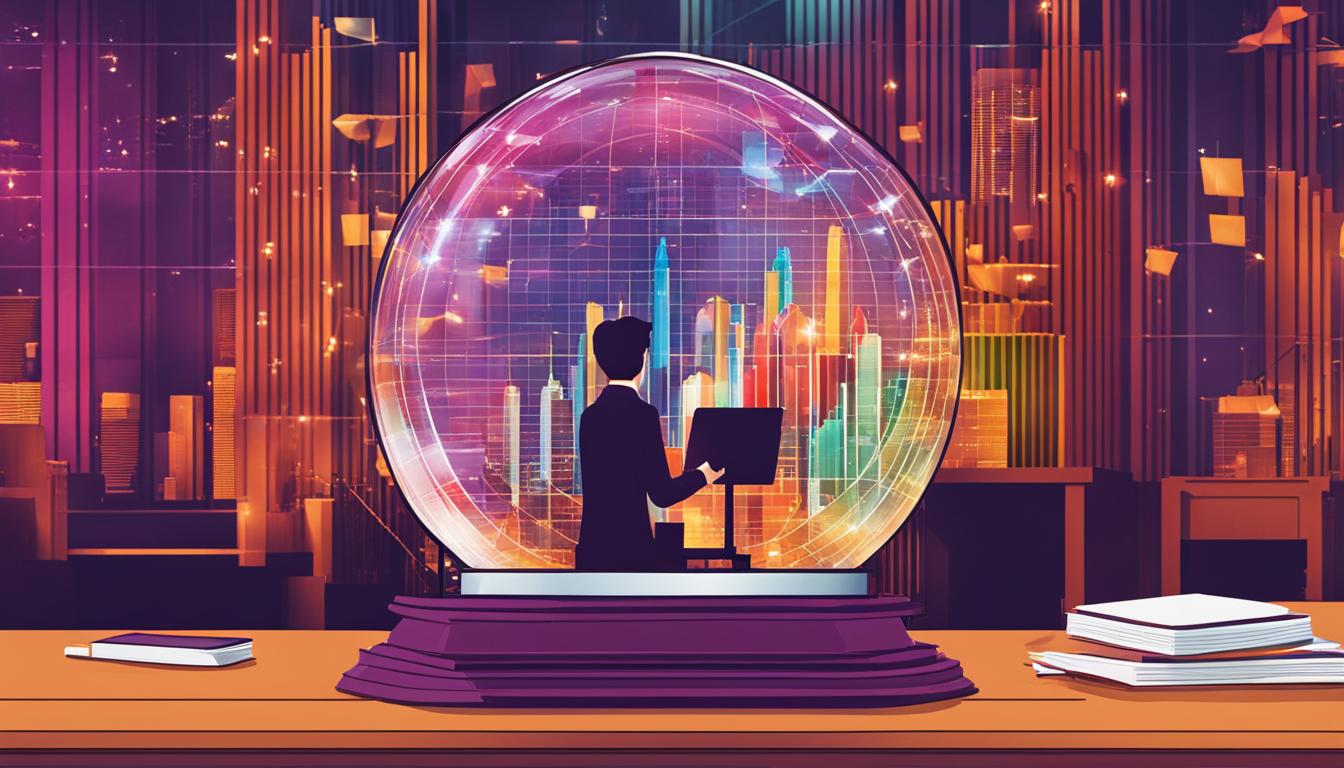
In today’s fast-paced business environment, it is essential for small businesses to stay ahead of their competitors in order to succeed. These small companies require powerful tools that can quickly analyze large amounts of data and produce precise predictions, allowing them to make well-informed decisions and stimulate growth. Predictive analytics, combined with artificial intelligence, fulfills this vital role.
At [YourCompany], we understand the importance of leveraging advanced analytics to unlock your small business’s full potential. Our predictive analytics solutions are specifically designed to cater to the unique needs of small businesses, providing you with valuable insights for future business strategies.
Key Takeaways:
- Predictive analytics, powered by artificial intelligence, enables small businesses to make informed decisions and drive growth.
- By analyzing large amounts of data quickly, predictive analytics generates accurate predictions and valuable insights for future business strategies.
- [YourCompany]’s predictive analytics solutions are tailored to meet the unique needs of small businesses, empowering them to stay ahead of the competition.
- Unlock your small business’s full potential by leveraging advanced analytics and embracing the power of predictive analytics.
- Stay tuned for the upcoming sections to dive deeper into the role of AI in predictive analytics, the benefits it offers, and how it can transform your small business.
Understanding the Role of AI in Predictive Analytics
AI predictive analytics plays a crucial role in harnessing the power of data for small businesses. By incorporating artificial intelligence into predictive analytics, businesses can leverage AI models to analyze data, generate accurate predictions, and derive valuable insights. With the help of algorithms, AI models can quickly process large amounts of data, enabling businesses to make predictions based on millions of data points within minutes. This allows small businesses to stay ahead of the competition by making data-driven decisions and uncovering trends that may not be apparent through traditional data analysis methods.
AI models are the driving force behind data analysis in predictive analytics. These models utilize sophisticated algorithms to interpret and make sense of vast amounts of data, uncovering patterns, correlations, and trends that can provide valuable insights. By understanding how AI models analyze and interpret data, small businesses can gain a deeper understanding of their operations, customer behavior, and market trends. This knowledge can empower businesses to optimize their strategies, improve operational efficiency, and enhance their decision-making process.
Predictive analytics, powered by AI, holds the key to unlocking accurate predictions and driving meaningful business insights. By leveraging data analysis techniques, algorithms, and AI models, small businesses can harness the power of predictive analytics to gain a competitive edge in today’s data-driven world.
Understanding the Role of AI in Predictive Analytics
| Benefits of AI in Predictive Analytics | Components of AI Predictive Analytics |
|---|---|
|
|
The Benefits of AI Predictive Analytics
Adopting AI predictive analytics offers several benefits to small businesses. It enables better decision-making by providing accurate insights and predictions based on comprehensive data analysis. With AI, we can generate accurate predictions quickly, allowing us to make informed decisions that drive growth. By leveraging AI models and algorithms, we can process large amounts of data efficiently, saving valuable time and resources. This increased efficiency allows us to focus on strategic initiatives and drive productivity.
AI predictive analytics also helps enhance customer experiences by enabling personalized marketing campaigns and tailored product offerings. By analyzing customer data, such as purchase history and browsing behavior, we can gain a deeper understanding of their preferences and needs. This allows us to deliver targeted marketing messages and create personalized experiences that increase customer satisfaction and loyalty. With AI predictive analytics, we can build stronger relationships with our customers and differentiate ourselves from the competition.
“AI predictive analytics reduces the risk of making uninformed decisions by providing data-driven recommendations. By analyzing historical data and market trends, we can anticipate shifts and make proactive adjustments to our strategies. This risk mitigation allows us to navigate uncertainties and make smarter choices that minimize potential losses.”
Reducing risk is another significant advantage of AI predictive analytics. By analyzing historical data and market trends, we can identify potential risks and make proactive adjustments to our strategies. This data-driven approach helps us minimize potential losses and navigate uncertainties effectively. By leveraging AI predictive analytics, we can make informed decisions that reduce risk and increase the likelihood of business success.
Key Benefits of AI Predictive Analytics:
- Better decision-making based on accurate insights and predictions
- Increased efficiency through quick data analysis and processing
- Enhanced customer experiences through personalized marketing and tailored product offerings
- Reduced risk by providing data-driven recommendations
| Benefits | Descriptions |
|---|---|
| Better Decision-Making | AI predictive analytics provides accurate insights and predictions, enabling informed decision-making. |
| Increased Efficiency | AI models and algorithms can process large amounts of data quickly, improving efficiency. |
| Enhanced Customer Experiences | Personalized marketing and tailored product offerings improve customer satisfaction and loyalty. |
| Reduced Risk | Data-driven recommendations help mitigate risks and navigate uncertainties. |
By embracing AI predictive analytics, small businesses can unlock the benefits of better decision-making, increased efficiency, enhanced customer experiences, and reduced risk. These advantages propel business growth and position us for success in today’s competitive landscape. As we continue to harness the power of AI and data analytics, we can make strategic decisions that drive our business forward and ensure long-term sustainability.
Industries Leveraging AI Predictive Analytics
Various industries are harnessing the power of AI predictive analytics to drive growth and enhance their operations. Let’s explore how healthcare, finance, marketing and sales, and customer service are leveraging this cutting-edge technology.
Healthcare
In the healthcare industry, AI predictive analytics is revolutionizing patient care. Doctors can use predictive models to improve diagnoses and treatment plans. By analyzing patient data, such as medical history, lab results, and symptoms, AI algorithms can provide insights that help physicians make accurate predictions and informed decisions. This enables healthcare professionals to deliver personalized treatment options and improve patient outcomes.
Finance
In the finance industry, AI predictive analytics is instrumental in financial analysis and market predictions. Financial institutions leverage AI models to analyze vast amounts of data, including market trends, historical performance, and customer behavior. This helps them identify investment opportunities, forecast market fluctuations, and manage risks effectively. By utilizing predictive analytics, financial institutions can make data-driven decisions that optimize their profitability and drive business growth.
Marketing and Sales
Marketing and sales teams rely on AI predictive analytics to develop targeted campaigns and optimize customer engagement. By analyzing customer data, such as purchase history, demographics, and online behavior, AI algorithms can identify patterns and preferences. This allows businesses to tailor marketing messages, optimize pricing strategies, and deliver personalized experiences to customers. By leveraging predictive analytics, marketing and sales professionals can enhance customer acquisition, retention, and overall satisfaction.
Customer Service
In the realm of customer service, AI predictive analytics plays a vital role in providing personalized experiences and improving satisfaction. By analyzing customer data, such as past interactions, preferences, and sentiment analysis, businesses can anticipate customer needs and proactively address issues. This enables customer service teams to provide tailored support, recommend relevant products or services, and deliver exceptional customer experiences. AI predictive analytics empowers businesses to build strong customer relationships and foster loyalty.
These industries are just a few examples of how AI predictive analytics is transforming businesses. By harnessing the power of data and AI, organizations can unlock valuable insights, drive informed decision-making, and gain a competitive edge in today’s digital landscape.
The Importance of Data in Predictive Analytics
Data is the foundation of any successful predictive analytics strategy. Without quality data, businesses cannot effectively analyze trends, identify patterns, or make data-driven decisions. Collecting and analyzing data provides valuable insights that drive business growth and inform strategic decision-making processes.
By leveraging data, businesses can uncover hidden correlations, spot emerging market trends, and gain a deeper understanding of customer behavior. These insights enable businesses to make informed decisions based on evidence rather than guesswork, which is crucial in today’s competitive landscape.
The Power of Insights
Insights gained from data analysis can shape every aspect of a business, from product development and marketing strategies to operational efficiencies and customer experiences. For example, analyzing customer data can help businesses personalize marketing messages, offer tailored product recommendations, and improve overall customer satisfaction.
Data-driven decision making is not only important for individual businesses but also for the overall industry. By analyzing industry-wide data, businesses can identify trends and shifts that impact their sector, enabling them to adapt and stay ahead of the competition.
Ultimately, data-driven decision making is a game-changer for small businesses. It allows them to optimize operations, enhance customer experiences, and drive sustainable growth. Embracing data as a valuable asset is essential for long-term success in an increasingly data-centric world.
| Benefits of Data in Predictive Analytics | Examples |
|---|---|
| Better decision-making | Analyzing customer data to personalize marketing campaigns and improve product offerings |
| Enhanced operational efficiencies | Identifying bottlenecks and streamlining processes based on data insights |
| Improved customer experiences | Utilizing customer data to provide personalized services and tailored experiences |
| Adaptation to market trends | Using industry-wide data to identify shifts and make informed business strategies |
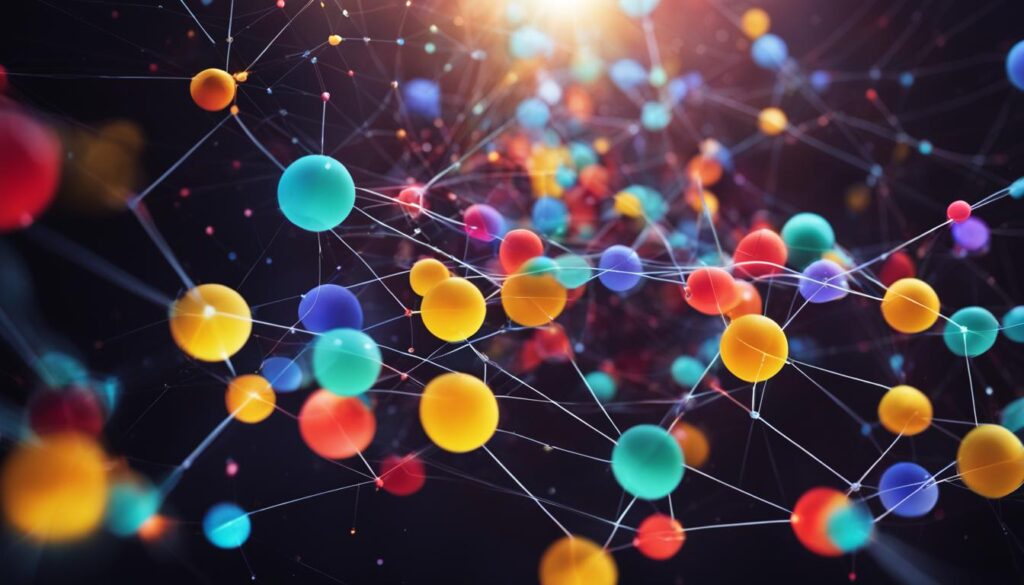
Defining Key Performance Indicators (KPIs) for Data Analysis
When it comes to data analysis, identifying and tracking Key Performance Indicators (KPIs) is essential for small businesses. KPIs are quantifiable metrics that provide insights into various aspects of business performance. By defining the right KPIs, businesses can align their data analysis efforts with their overall strategic goals and focus on areas that contribute to their growth.
There are several key steps to defining KPIs for effective data analysis. First, businesses need to identify their specific business goals. Whether it’s improving customer satisfaction, increasing operational efficiency, or driving sales, having a clear understanding of the desired outcomes will help determine which metrics to track.
Once the goals are established, the next step is selecting the relevant metrics that align with those goals. These metrics can vary depending on the nature of the business and the specific objectives. For example, if the goal is to improve customer satisfaction, metrics like customer retention rate, Net Promoter Score (NPS), or customer feedback ratings can be considered as KPIs.
It’s important to note that the chosen KPIs should be measurable, achievable, and relevant to the business objectives. Regular tracking and analysis of these metrics will provide valuable insights into performance trends, areas for improvement, and opportunities for growth. By focusing on the right KPIs, businesses can effectively harness the power of data analysis to make informed decisions and drive success.
Example: Key Performance Indicators for an E-commerce Business
| KPI | Metric |
|---|---|
| Conversion Rate | The percentage of website visitors who make a purchase |
| Average Order Value | The average value of each customer order |
| Customer Lifetime Value (CLV) | The predicted net profit from a customer over their entire relationship with the business |
| Cart Abandonment Rate | The percentage of customers who add items to the cart but do not complete the purchase |
| Return Rate | The percentage of products returned by customers |
In this example, an e-commerce business might focus on tracking metrics like conversion rate, average order value, customer lifetime value (CLV), cart abandonment rate, and return rate to assess the success of their online sales efforts. These KPIs provide valuable insights into different aspects of the business, such as customer behavior, revenue generation, and overall customer satisfaction.
By defining and tracking relevant KPIs, businesses can gain a deeper understanding of their performance, identify areas for improvement, and make data-driven decisions to achieve their desired business outcomes.
Collecting and Analyzing Data for Predictive Analytics
Collecting and organizing data is a crucial step in harnessing the power of predictive analytics. It lays the foundation for generating valuable insights that can drive informed decision-making and fuel business growth. Small businesses can leverage various data collection tools and platforms to simplify the process and ensure accurate and comprehensive data acquisition.
Once the data is collected, employing data analysis techniques opens up a world of possibilities for extracting meaningful insights. Techniques such as visualizations and trend analysis allow businesses to identify patterns and correlations within the data, enabling them to make informed predictions and optimize their strategies. These insights can provide valuable guidance in understanding market trends, optimizing operations, and personalizing customer experiences.
To illustrate the importance of data analysis, let’s take a look at an example table:
| Month | Revenue | Website Traffic | Conversion Rate |
|---|---|---|---|
| January | $10,000 | 5,000 | 2% |
| February | $12,000 | 6,200 | 1.8% |
| March | $15,000 | 7,500 | 2.2% |
This table provides a snapshot of key metrics for three consecutive months. By analyzing this data, we can identify trends and insights. For instance, we can see that the revenue has been increasing month over month, indicating positive growth. Additionally, the conversion rate has fluctuated, suggesting potential opportunities for optimization. By delving deeper into this data and performing more extensive analysis, businesses can uncover valuable insights to inform strategic decision-making and drive growth.

Maximizing Insights through Data-driven Decision Making
Data collection and analysis enable businesses to make data-driven decisions, which have become increasingly essential in today’s competitive landscape. By using data to inform strategies and identify opportunities, small businesses can stay ahead of the curve and capitalize on emerging trends. It is crucial to continuously collect and analyze data to ensure that insights remain relevant and up-to-date. By adopting a data-driven approach, businesses can take calculated risks, optimize operations, and drive sustainable growth.
Identifying Patterns and Trends with Predictive Analytics
Predictive analytics allows us to dive deep into our historical data and uncover valuable patterns and trends. By analyzing our data, we can identify correlations and anticipate market shifts, giving us a competitive advantage in our industry. Let’s take a closer look at how predictive analytics can help us optimize our inventory management and refine our marketing strategies.
Optimizing Inventory Management
Understanding historical data can significantly improve our inventory management process. By analyzing past sales data, we can identify which products are popular during specific seasons or events. This insight allows us to adjust our inventory levels accordingly, minimizing the risk of overstocking or running out of stock. With predictive analytics, we can forecast demand accurately, ensuring that we always have the right products in stock and reducing costs associated with inventory management.
Refining Marketing Strategies
Market trends and consumer preferences are constantly evolving. To stay ahead of the competition, we need to adapt our marketing strategies accordingly. Predictive analytics enables us to analyze historical data to identify patterns in customer behavior, purchasing habits, and market trends. Armed with this knowledge, we can develop targeted marketing campaigns that resonate with our target audience. By tailoring our messages and offers to specific customer segments, we can increase customer engagement, drive conversions, and ultimately boost our revenue.
Key Takeaways
- Historical data analysis is crucial for identifying patterns and trends.
- Predictive analytics helps optimize inventory management and reduce costs.
- Analyzing market shifts enables us to refine our marketing strategies and drive revenue growth.
By leveraging the power of predictive analytics, we can make data-driven decisions that lead to business success. Whether it’s optimizing inventory management or refining marketing strategies, understanding historical data can give us a competitive edge in today’s fast-paced business environment.
Enhancing Customer Experiences with Predictive Analytics
In today’s competitive business landscape, customer satisfaction is a key driver of success. Small businesses are increasingly turning to predictive analytics to enhance customer experiences and gain a competitive edge. By leveraging data analysis and AI-powered models, businesses can personalize marketing efforts, optimize product offerings, and deliver tailored experiences that resonate with customers.
One of the primary benefits of predictive analytics is the ability to create personalized marketing campaigns. By analyzing customer data, businesses can gain insights into individual preferences and behaviors. This information allows for targeted messaging and offers that are more likely to capture the attention and interest of customers. Whether it’s a personalized email, a tailored recommendation, or a special promotion, predictive analytics enables businesses to engage customers on a more personal level, increasing the likelihood of conversion and fostering long-term loyalty.
“Predictive analytics allows us to better understand our customers and anticipate their needs. By analyzing data on past purchases, browsing behavior, and interactions with our brand, we can tailor our marketing messages to each individual. This personalized approach not only enhances the customer experience but also drives higher engagement and conversion rates.”
In addition to personalized marketing, predictive analytics also enables businesses to optimize their product offerings. By analyzing customer data and market trends, businesses can identify emerging preferences and adapt their offerings accordingly. This data-driven approach ensures that businesses are delivering products that are in line with customer demands, increasing the likelihood of satisfaction and repeat purchases. Whether it’s introducing new features, expanding product lines, or refining existing offerings, predictive analytics provides the insights needed to make informed decisions that drive customer satisfaction.
Overall, predictive analytics empowers small businesses to deliver exceptional customer experiences. By leveraging data and AI-powered models, businesses can personalize marketing efforts, optimize product offerings, and create tailored experiences that resonate with customers. In today’s customer-centric landscape, leveraging predictive analytics is essential for businesses looking to enhance customer satisfaction, increase loyalty, and drive sustainable growth.
Mitigating Risks and Improving Efficiency with Predictive Analytics
Predictive analytics is a powerful tool that small businesses can leverage to mitigate risks and improve operational efficiency. By analyzing financial data and market trends, businesses can proactively identify potential threats and make data-driven decisions to mitigate risks. This allows them to adjust strategies accordingly, ensuring they are well-prepared for any challenges that may arise.
Additionally, predictive analytics helps businesses optimize their operations and improve overall efficiency. By identifying bottlenecks and streamlining processes, businesses can eliminate inefficiencies and reduce costs. This not only enhances productivity but also frees up resources that can be allocated to other areas of the business, further driving growth and success.
Implementing predictive analytics also enables businesses to make data-driven decisions. By leveraging data insights and predictions, businesses can confidently make informed choices that align with their goals and objectives. This eliminates the reliance on guesswork and intuition, ensuring that decisions are based on concrete data and analysis.
To fully harness the power of predictive analytics, businesses need to prioritize data collection and analysis. By integrating advanced analytics tools and establishing robust data management processes, businesses can unlock the full potential of their data. This allows for more accurate predictions, comprehensive risk analysis, and improved overall performance.
Table: Examples of Risk Mitigation and Improved Efficiency with Predictive Analytics
| Risk Category | Predictive Analytics Application | Benefits |
|---|---|---|
| Market Volatility | Forecasting market trends and predicting shifts | Proactive decision-making, reduced financial loss |
| Supply Chain Disruptions | Analyzing historical data and identifying potential disruptions | Improved inventory management, minimized disruptions |
| Customer Churn | Identifying customer behavior patterns and predicting churn | Targeted retention strategies, increased customer loyalty |
| Operational Inefficiencies | Streamlining processes and identifying bottlenecks | Enhanced productivity, reduced costs |
By employing predictive analytics, small businesses can effectively mitigate risks, improve operational efficiency, and make data-driven decisions. This empowers them to navigate uncertainties, optimize their operations, and drive sustainable growth in today’s competitive business landscape.
Embracing a Data-Driven Culture for Business Success
In today’s digital age, data has become a valuable asset for businesses of all sizes. Small businesses, in particular, can greatly benefit from adopting a data-driven culture within their organization. By embracing data-driven decision making, fostering data literacy, utilizing data analysis tools, and cultivating an organizational culture that values data, small businesses can unlock their full potential and drive business success.
One of the key aspects of a data-driven culture is making decisions based on data rather than intuition or guesswork. This involves using data to gain insights, identify trends, and make informed decisions that align with business goals. By relying on data, small businesses can minimize risks, optimize operations, and seize growth opportunities.
Benefits of a Data-Driven Culture
A data-driven culture also involves developing data literacy within the organization. This means equipping employees with the skills and knowledge needed to effectively analyze and interpret data. By providing training and resources, small businesses can empower their employees to harness the full potential of data analysis tools and make data-driven decisions. This not only enhances the accuracy of decision making but also promotes a culture of continuous learning and improvement.
Implementing data analysis tools is another critical aspect of embracing a data-driven culture. These tools enable businesses to collect, organize, and analyze data in a structured and efficient manner. By leveraging data analysis tools, small businesses can uncover insights, identify patterns, and make data-driven decisions with greater ease and accuracy.
“Data-driven decision making is the key to unlocking business success in the digital age.”
Lastly, fostering an organizational culture that values data is crucial for sustained success. This involves creating an environment where data is seen as a strategic asset and is used to guide decision making at all levels of the organization. By prioritizing data-driven approaches and encouraging collaboration and transparency, small businesses can build a culture that fosters innovation, agility, and growth.
By embracing a data-driven culture, small businesses can position themselves for long-term success in an increasingly data-centric world. By making data-driven decisions, promoting data literacy, utilizing data analysis tools, and fostering an organizational culture that values data, small businesses can thrive and achieve sustainable growth.
| Data-Driven Culture Benefits | Explanation |
|---|---|
| Improved Decision Making | By leveraging data, businesses can make informed decisions that align with their goals. |
| Enhanced Efficiency | Data analysis tools streamline processes and optimize operations, leading to increased efficiency. |
| Competitive Advantage | A data-driven culture positions businesses ahead of competitors by leveraging data insights. |
| Innovation and Growth | Data-driven approaches foster innovation and drive business growth. |
Conclusion
At our company, we understand the importance of data analytics for small businesses in driving sustainable business growth. Predictive analytics, powered by artificial intelligence, provides small businesses with powerful tools to make informed decisions and unlock their growth potential.
By leveraging data and employing AI models, small businesses can gain valuable insights and predictions that help them make better decisions and drive their business forward. Predictive analytics not only enhances decision-making but also enhances customer experiences, mitigates risks, and improves operational efficiency.
Embracing a data-driven approach and fostering a culture of analytics is crucial in today’s digital age. Small businesses that recognize the power of predictive analytics and invest in data analysis will have a competitive advantage in their respective industries. By using data analytics as a foundation for business strategies, small businesses can achieve sustainable growth and stay ahead in the market.
Ultimately, data analytics is the key to unlocking business growth for small businesses. By adopting predictive analytics solutions, small businesses can harness the power of data to make smarter decisions, enhance customer experiences, mitigate risks, and improve operational efficiency—all essential factors for long-term success.
FAQ
What is predictive analytics?
Predictive analytics is the process of using historical and real-time data to make predictions about future outcomes, trends, and behaviors. It leverages advanced analytics techniques, including artificial intelligence, to analyze large datasets and generate accurate predictions.
How can small businesses benefit from AI predictive analytics?
Small businesses can benefit from AI predictive analytics in several ways. It enables better decision-making by providing accurate insights and predictions. It improves efficiency by automating data processing tasks. It helps enhance customer experiences through personalized marketing campaigns. And it reduces the risk of making uninformed decisions by providing data-driven recommendations.
Which industries are leveraging AI predictive analytics?
Various industries are leveraging AI predictive analytics. In healthcare, it is used to improve diagnoses and treatment plans. The finance industry uses it for financial analysis and market predictions. Marketing and sales teams utilize it to develop targeted campaigns. Customer service departments leverage it to provide personalized services. AI predictive analytics has become prevalent across different sectors.
How important is data in predictive analytics?
Data is the foundation of predictive analytics. It provides valuable insights that drive data-driven decision-making. By collecting and analyzing data, small businesses can gain a deeper understanding of their operations, market trends, and customer behavior. This understanding helps them make informed decisions and propel their growth strategies.
What are Key Performance Indicators (KPIs) in data analysis?
Key Performance Indicators (KPIs) are quantifiable metrics that provide a clear picture of performance. Small businesses should define and track KPIs that align with their business goals. By selecting the right KPIs, businesses can focus their data analysis efforts on areas that contribute to their growth and identify areas for improvement.
How can small businesses collect and analyze data for predictive analytics?
Small businesses can collect and organize data by implementing systems and using various tools and platforms. Once the data is collected, data analysis techniques like visualizations and trend analysis can help extract meaningful insights. By analyzing data, businesses can gain valuable insights into their operations, market trends, and customer behavior.
How does predictive analytics help businesses identify patterns and trends?
Predictive analytics allows small businesses to analyze historical data and uncover correlations, understand customer preferences, and anticipate market shifts. This information can be used to optimize inventory management, refine marketing strategies, and make data-driven decisions that drive growth.
How can predictive analytics enhance customer experiences?
By analyzing customer data such as feedback, purchase history, and browsing behavior, businesses can personalize marketing messages, improve product offerings, and tailor the overall customer experience. This personalized approach builds customer satisfaction, loyalty, and ultimately drives business growth.
How does predictive analytics help businesses mitigate risks and improve efficiency?
Predictive analytics helps businesses mitigate risks by analyzing financial data, market trends, and other factors. By identifying potential threats and adjusting strategies accordingly, businesses can proactively mitigate risks and improve their overall performance. It also improves efficiency by identifying bottlenecks, streamlining processes, and optimizing operations, which enhances productivity, reduces costs, and drives business growth.
How can small businesses embrace a data-driven culture?
To fully leverage the power of predictive analytics, small businesses must embrace a data-driven culture within their organization. This involves promoting data literacy, training employees on data analysis tools, and fostering a mindset of using data in daily decision-making processes. By instilling a data-driven culture, businesses can ensure that data is valued and utilized effectively, driving business success and growth.
Bennett is the embodiment of versatility, adapting his writing to cover a broad spectrum of topics with professionalism and flair. Whether it’s breaking news, in-depth analyses, or feature pieces, Bennett’s contributions enrich Press Report with diverse perspectives and engaging content. His adaptability and keen journalistic instincts make him a vital member of our team, capable of capturing the essence of the moment in every story.
AI Entertainment
Exploring the AI Trend on Instagram: Next-Level Engagement

In this article, we will explore the realm of Artificial Intelligence (AI) and how it is influencing Instagram. Our focus is to examine the latest advancements in AI, including AI-powered filters and improved storytelling features, that are transforming how users engage, create content, and interact on the platform.
Key Takeaways:
- The AI trend on Instagram is transforming the way users engage and create on the platform.
- AI-powered filters enhance the visual appeal of photos and simplify the editing process.
- AI-driven storytelling features provide a more interactive and engaging experience for creators and their audience.
- AI content recommendations personalize users’ feeds and expose them to diverse content.
- AI-powered analytics offer valuable insights for optimizing content strategy and understanding the audience on a deeper level.
The Power of AI-Powered Filters on Instagram
AI-powered filters have revolutionized the way we enhance and transform our photos on Instagram. These filters utilize advanced AI algorithms to analyze user preferences, style choices, and facial features, resulting in personalized filters that align with our unique creative vision. With a wide range of AI-powered filters to choose from, we can easily enhance the visual appeal of our photos and create visually stunning content on Instagram.
What sets AI-powered filters apart is their ability to automate the editing process while still producing professional-looking results. With just a few taps, we can achieve eye-catching photos that capture attention and stand out on the platform. This time-saving feature is especially beneficial for users who may not have extensive photo editing skills but still want to create visually appealing content that resonates with their audience.
Moreover, AI-powered filters offer a level of personalization that allows us to express our creativity in unique ways. By analyzing our preferences and style choices, these filters generate personalized effects that truly reflect our individual aesthetic. This level of customization not only enhances the visual appeal of our photos but also helps us to establish a distinct and recognizable brand identity on Instagram.
Overall, AI-powered filters have transformed the way we edit and create content on Instagram. They provide us with the tools to effortlessly enhance our photos, save time, and create visually stunning content that engages our audience. With their ability to analyze user preferences and generate personalized effects, these filters empower us to unleash our creativity and make a lasting impact on the platform’s visual landscape.
Table: Comparing the Impact of AI-Powered Filters
| Filter Type | Benefits |
|---|---|
| Traditional Filters | – Limited customization |
| – Generic effects | |
| – Time-consuming editing process | |
| – Lack of personalization | |
| AI-Powered Filters | – Personalized effects aligned with user preferences |
| – Professional-looking results with minimal effort | |
| – Time-saving editing process | |
| – Enhanced visual appeal of photos |
AI-powered filters provide us with a level of customization and efficiency that traditional filters simply cannot match. With their ability to analyze user preferences and style choices, these filters generate personalized effects that align with our unique creative vision. Not only do they save us time in the editing process, but they also produce professional-looking results that capture attention and enhance the visual appeal of our photos.
Enhancing Storytelling with AI on Instagram
In today’s digital age, storytelling has taken on a whole new level of creativity, thanks to AI-powered features on Instagram. These innovative tools offer users the opportunity to captivate their audience with compelling narratives and create immersive experiences. Whether you’re a content creator or a casual user, AI-driven storytelling on Instagram has something to offer everyone.
A Closer Look at AI-Driven Storytelling Features
One of the key features of AI-driven storytelling on Instagram is automated captions. This powerful tool analyzes the content of a post and generates accurate captions, saving users valuable time and effort. With automated captions, creators can ensure their message is accessible to a wide range of audiences, including those who are deaf or hard of hearing.
Another exciting aspect of AI-driven storytelling is personalized recommendations. By analyzing user preferences, browsing habits, and engagement patterns, Instagram’s AI algorithms curate a personalized content feed for each user. This means that users are constantly exposed to content that aligns with their interests, allowing them to discover new accounts, posts, and hashtags that resonate with them.
The interactive content feature is yet another aspect of AI-driven storytelling on Instagram. This feature allows creators to actively engage with their audience through polls, quizzes, and other interactive elements. By gathering insights and feedback, creators can tailor their content to better meet the needs and preferences of their audience, creating a more immersive and engaging storytelling experience.
| Benefits of AI-Driven Storytelling on Instagram | Examples |
|---|---|
| Enhanced accessibility through automated captions | Example: Creators can reach a wider audience, including those who are deaf or hard of hearing, by providing accurate and automatically generated captions. |
| Discover new content tailored to your interests | Example: Instagram’s personalized recommendations feature ensures that users never run out of inspiration and discover new accounts, posts, and hashtags that align with their passions. |
| Engage with your audience through interactive content | Example: Polls, quizzes, and other interactive elements allow creators to actively engage with their audience and gather insights, creating a more immersive storytelling experience. |
As AI continues to advance, the possibilities for storytelling on Instagram are endless. From automated captions to personalized recommendations and interactive content, AI-driven features are transforming the way we engage, create, and interact on the platform. Whether you’re a creator looking to captivate your audience or a user seeking new and exciting content, AI-powered storytelling on Instagram is sure to enhance your experience.
The Power of AI-Powered Filters on Instagram
AI-powered filters on Instagram revolutionize the way users edit and enhance their photos, offering a simplified editing process that produces professional-looking results. These filters leverage advanced AI algorithms to analyze and understand the characteristics of an image, automatically applying adjustments and enhancements that align with the user’s desired style and aesthetic.
With AI-powered filters, users can save time and effort, as the filters automate the editing process and eliminate the need for extensive manual adjustments. Instead of spending hours fine-tuning every aspect of a photo, users can achieve stunning results with just a few taps, allowing them to focus more on their creativity and content creation.
The time-saving aspect of AI-powered filters is especially valuable for content creators, influencers, and businesses who need to consistently produce visually appealing content without sacrificing efficiency. By streamlining the editing process, these filters enable users to maintain a consistent visual theme and brand identity, enhancing their overall Instagram presence.
In addition to the time-saving benefits, AI-powered filters empower users without extensive photo editing skills to create professional-looking photos. With just a few taps, users can achieve results that were once only possible with advanced editing techniques. This accessibility allows a wider range of Instagram users to express their creativity and showcase their unique visual perspective.
The Impact of AI-Powered Filters on Instagram’s Visual Landscape
“AI-powered filters on Instagram have transformed the way users edit their photos, providing a simplified editing process that produces stunning, professional-looking results with minimal effort.” – Instagram influencer
Overall, AI-powered filters on Instagram have revolutionized the editing process, simplifying it and providing users with the tools to create visually captivating content. By saving time, enhancing accessibility, and delivering professional-looking results, these filters empower users to make their mark on Instagram’s visual landscape, showcasing their creativity and style to a wider audience.
Unlock Your Creativity with AI-Powered Filters
AI-driven photo editing on Instagram allows users to unleash their creativity and transform their photos into professional-looking masterpieces. With the power of AI-powered filters, users can take their photo editing skills to the next level and create stunning visuals that capture attention.
These AI-powered filters analyze the image and make automatic adjustments to enhance colors, lighting, and overall composition. By utilizing these filters, users can save time on manual editing and achieve consistent and visually appealing results with just a few taps.
Whether you’re a professional photographer or an amateur enthusiast, AI-powered filters provide a wide range of options to suit your unique style and creative vision. From vintage-inspired looks to modern and vibrant aesthetics, these filters offer endless possibilities for expressing your creativity and making a lasting impact on your audience.
Unleash Your Creative Potential
- Create unique and eye-catching visuals with AI-powered filters
- Save time on manual editing and achieve professional-looking results
- Explore a wide range of filter options to suit your style and vision
- Express your creativity and make a lasting impact on your audience
With AI-powered filters, you have the tools to unlock your creative potential and elevate your photo editing skills. Whether you want to enhance the colors, add artistic effects, or create a cohesive aesthetic for your feed, AI-driven photo editing provides the perfect solution to bring your vision to life.
| Benefits of AI-Powered Filters on Instagram | Example |
|---|---|
| Time-saving | Users can achieve professional-looking results with just a few taps, saving time on manual editing. |
| Consistency | AI-powered filters ensure consistent results, making it easier to maintain a cohesive aesthetic. |
| Creativity | Users can explore a wide range of filter options to experiment with different styles and effects. |
| Professional-grade results | AI-powered filters enhance colors, lighting, and composition to achieve stunning visuals. |

AI Content Recommendations on Instagram
Instagram’s AI-powered content recommendations feature is designed to enhance user experience by providing personalized content feeds. Through advanced algorithms, Instagram analyzes user preferences, browsing habits, and engagement patterns to curate a diverse selection of content that aligns with individual interests.
With AI content recommendations, users are exposed to a continuous stream of engaging posts, accounts, and hashtags, ensuring they never run out of inspiration. The personalized feed allows users to discover new content that resonates with their passions, making their Instagram experience more enjoyable and immersive.
By presenting users with a wide range of diverse content, AI content recommendations encourage users to explore different topics, interests, and perspectives. This exposure to diverse content not only broadens users’ horizons but also fosters a sense of community as they engage with a wide range of creators and discover new accounts that share their interests.
Engaging with content becomes effortless with AI-powered recommendations. Users can easily like, comment on, and share the content that captures their attention, further fueling their connection with the Instagram community. The AI content recommendations feature plays a crucial role in creating a vibrant and interactive platform where users can truly engage with the content that matters to them.

Table: Benefits of AI Content Recommendations on Instagram
| Benefits | Description |
|---|---|
| Personalized content feeds | Users receive a curated selection of content based on their interests and preferences. |
| Diverse content | AI recommendations expose users to a wide range of content, encouraging exploration and discovery. |
| Engage with content | Users can easily interact with the content that resonates with them, fostering a vibrant community. |
Bringing you closer to the people and things you love
Instagram, with its massive user base and highly engaged community, has become a platform where businesses can effectively connect with their target audience. By utilizing the power of user engagement, businesses can showcase their products and build brand loyalty. From subtle marketing tricks to authentic content, Instagram offers a range of opportunities for businesses to reach their customers like never before.
One of the key strategies employed by businesses on Instagram is leveraging the influence of celebrities and influencers. These social media icons know how to capture user attention and promote products in a way that feels natural and genuine. By incorporating products seamlessly into their posts and stories, they create a subtle marketing approach that resonates with their followers. This influencer marketing tactic allows businesses to tap into the existing trust and loyalty of these influencers’ audiences, leading to increased brand awareness and potential sales.
Instagram also provides businesses with the ability to showcase their products in an engaging and visually appealing way. Through high-quality images, videos, and captivating captions, businesses can grab the attention of their target audience and convey their brand story effectively. With the right combination of creativity and strategic planning, Instagram can serve as a powerful platform for businesses to engage with their audience, highlight their products, and ultimately drive sales.
As businesses continue to find innovative ways to connect with their audience on Instagram, it’s important to remember the importance of authenticity and building genuine relationships. By understanding the interests and preferences of their target audience, businesses can create content that resonates with their followers, fostering a sense of community and loyalty. Whether it’s through engaging captions, interactive stories, or user-generated content, Instagram offers endless possibilities for businesses to bring themselves closer to the people and things they love.
| Key Points | Key Benefits |
|---|---|
| Utilize user engagement | Build brand loyalty |
| Employ subtle marketing tricks | Increase brand awareness |
| Showcase products effectively | Drive sales |
| Create authentic relationships | Foster community and loyalty |
Interesting Stats about Instagram
Instagram has become one of the most popular social media platforms with over 500 million active users every day. This massive user base provides an excellent opportunity for businesses to increase their brand awareness and engage with their audience. With more than half of its users visiting the platform daily, Instagram offers a significant potential for businesses to reach a wide audience and build a strong online presence.
On Instagram, engagement is key. It’s not just about the number of followers, but how actively users interact with the content. Two-thirds of Instagram users actively search for brands on the platform, demonstrating their intent to engage with businesses and explore products and services. This engagement creates a fertile ground for brands to connect with their target audience, foster relationships, and drive sales.
Building brand awareness is another crucial aspect of Instagram. With the platform’s extensive reach and active user base, businesses have the opportunity to showcase their products and services to a wide audience. Many celebrities and influencers leverage subtle marketing tricks to capture user attention and promote products effectively. By strategically positioning their brand on Instagram, businesses can increase their visibility, expand their reach, and tap into the vast potential of this social media platform.
“Engagement is key on Instagram. With millions of active users and high levels of user interaction, businesses have a unique opportunity to build brand awareness and foster meaningful connections with their audience.”
| Active Users | 500 million | 2.8 billion | 330 million |
| Engagement | High | High | Low |
| Brand Awareness | High | High | Medium |
Table: A comparison of active users, engagement, and brand awareness across popular social media platforms.
Unveiling the Power of AI-Powered Instagram Analytics
When it comes to understanding and optimizing your presence on Instagram, there’s no denying the power of AI-powered analytics tools. These tools provide a deeper understanding of your audience’s preferences, behaviors, and demographics, allowing you to make data-driven decisions that can have a significant impact on your Instagram strategy.
With AI-powered analytics, you gain valuable insights into your post performance, follower demographics, engagement patterns, and even sentiment analysis. This wealth of information helps you identify what content resonates most with your audience, allowing you to tailor your posts to their preferences and increase engagement.
One of the key benefits of AI-powered analytics is the ability to discover optimal posting times. By analyzing data trends, these tools can determine the times when your audience is most active on Instagram, maximizing the reach and impact of your posts. With this knowledge, you can time your content to perfection, ensuring that it reaches your audience when they are most likely to be online.
Another advantage of AI-powered analytics is the ability to track your progress and see the tangible results of your efforts. By monitoring key metrics such as follower growth, engagement rates, and post reach, you can gauge the effectiveness of your strategies and make adjustments as needed. This data-driven approach allows you to fine-tune your content and optimize your Instagram presence for maximum impact.
The Power of AI-Powered Instagram Analytics in Action
Let’s take a look at a real-world example to illustrate the power of AI-powered Instagram analytics. Imagine you are a fashion influencer looking to expand your reach and engage with a wider audience. By using AI-powered analytics, you discover that your posts featuring casual outfits receive significantly higher engagement than your formal wear posts.
Armed with this insight, you can now adjust your content strategy to focus more on casual fashion, creating posts that resonate with your audience. As a result, you see a significant increase in engagement, follower growth, and overall brand awareness. Without the power of AI-powered analytics, you may have continued to create content that didn’t resonate with your audience, missing out on valuable opportunities for growth.
“AI-powered analytics are like a window into the minds of our audience. They provide us with the insights we need to create content that truly connects with our followers.” – Fashion Influencer
In conclusion, AI-powered analytics are a game-changer when it comes to understanding and optimizing your Instagram strategy. By gaining a deeper understanding of your audience, discovering optimal posting times, and tracking your progress, you can make data-driven decisions that drive engagement and growth. Embrace the power of AI and unlock the full potential of your Instagram presence.
| Metric | Insights |
|---|---|
| Follower Growth | Identify periods of significant growth and correlate them with specific content and strategies. |
| Engagement Rates | Analyze which types of content generate the highest engagement rates and replicate their success. |
| Post Reach | Track the reach of your posts and understand which factors contribute to wider audience exposure. |
| Sentiment Analysis | Gain insights into how your audience feels about your content and adjust your strategy accordingly. |
Understanding Your Audience on a Deeper Level
We understand the importance of knowing your audience when it comes to creating engaging content on Instagram. That’s why we’ve delved into the world of AI-driven analytics tools that can provide valuable insights into your audience’s preferences, optimal posting times, and the type of content that resonates with their interests. By understanding your audience on a deeper level, you can create content that stands out and connects with your followers.
One of the key insights that AI-driven analytics tools provide is audience demographics. By analyzing data such as age, gender, location, and interests, you can gain a better understanding of who your followers are and tailor your content to their specific preferences. This can help you create content that resonates with your audience and build a stronger connection with them.
Another valuable feature of AI-driven analytics tools is the ability to determine the optimal posting times for your audience. By analyzing data on engagement patterns and user behavior, these tools can identify the times when your followers are most active on Instagram. This insight allows you to schedule your posts strategically, ensuring that your content reaches the maximum number of people and receives the highest level of engagement.
In addition to demographics and posting times, AI-driven analytics tools can also provide insights into the type of content that resonates with your audience. By analyzing engagement metrics such as likes, comments, and shares, these tools can identify the content that performs best and generates the most interaction. Armed with this information, you can create more of the content that your audience loves and increase your chances of capturing their attention.
To sum it up, understanding your audience on a deeper level is crucial for creating engaging content on Instagram. AI-driven analytics tools can provide valuable insights into your audience’s preferences, optimal posting times, and the type of content that resonates with them. By leveraging these insights, you can create content that stands out, connects with your followers, and ultimately drives greater engagement on the platform.
Table: Audience Insights
| Insight | Description |
|---|---|
| Demographics | Analyze audience age, gender, location, and interests to tailor content. |
| Optimal Posting Times | Identify when your audience is most active on Instagram for maximum reach and engagement. |
| Resonating Content | Analyze engagement metrics to determine the type of content that performs best. |
Conclusion
Throughout this article, we have explored the powerful impact of AI on Instagram and how it is shaping the platform’s future. The AI trend on Instagram is revolutionizing the way users engage, create, and interact, offering exciting opportunities for optimization and organic growth.
By embracing AI-powered filters, users can enhance the visual appeal of their photos and create visually stunning content that captivates their audience. The simplified editing process and professional-looking results achieved through AI-powered filters save time and eliminate the need for extensive photo editing skills.
AI-driven storytelling features bring a new level of interactivity and engagement to Instagram. With automated captions and personalized content recommendations, users can create immersive storytelling experiences that connect deeply with their audience. This leads to increased engagement and a more loyal following.
Furthermore, AI-powered analytics provide valuable insights into an Instagram audience’s preferences, behaviors, and demographics. By understanding the audience on a deeper level, users can optimize their content strategy, attract more followers, and achieve organic growth. AI-powered tools help users make data-driven decisions and unlock the full potential of their Instagram presence.
In conclusion, the AI trend on Instagram offers limitless possibilities for optimization and organic growth. By harnessing the power of AI-powered filters, storytelling features, and analytics, users can create visually stunning content, engage their audience, and achieve their Instagram goals. Keeping up with the ever-evolving world of Instagram means embracing the potential of AI and leveraging it to our advantage.
FAQ
How do AI-powered filters work on Instagram?
AI-powered filters on Instagram utilize advanced AI algorithms to transform ordinary images into captivating visuals. These filters analyze user preferences, style choices, and facial features to generate personalized filters that align with a user’s unique creative vision.
What are the benefits of AI-driven storytelling features on Instagram?
AI-driven storytelling features on Instagram provide a more interactive and engaging experience for creators and their audience. Automated captions save time and improve accessibility, while personalized recommendations help users discover new content that aligns with their interests. The interactive content feature allows creators to actively engage their audience and gather insights, creating a more immersive storytelling experience.
How do AI-powered filters simplify the editing process on Instagram?
AI-powered filters on Instagram automate the editing process, allowing users to create eye-catching photos with just a few taps. With a wide range of filters to choose from, users can save time and achieve visually stunning results without extensive photo editing skills.
How do AI-driven photo editing apps enhance photo editing skills on Instagram?
AI-driven photo editing apps on Instagram use powerful AI algorithms to analyze and enhance images, providing professional-looking results that capture attention. With AI-powered filters, users can take their photo editing to the next level and make a lasting impact on their audience.
How does Instagram’s AI content recommendations feature enhance the user experience?
Instagram’s AI content recommendations feature analyzes user preferences, browsing habits, and engagement patterns to curate personalized content feeds. This feature exposes users to diverse content that aligns with their interests, providing a continuous stream of engaging posts, accounts, and hashtags.
How can brands benefit from using Instagram for marketing?
Instagram has become a global platform where businesses can humanize their content, showcase products, and engage with their audience. Many celebrities and influencers use subtle marketing tricks to capture user attention and promote products effectively.
What are the statistics on Instagram’s user engagement and brand awareness?
Instagram has more than 500 million active users every day, making it one of the most popular social media platforms. More than half of its users visit the platform daily, and two-thirds of users search for brands on the platform. These statistics highlight the potential of Instagram for businesses to increase brand awareness and engage with their audience.
How can AI-powered analytics tools benefit Instagram users?
AI-powered analytics tools provide a deeper understanding of an Instagram audience’s preferences, behaviors, and demographics. These tools analyze post performance, follower demographics, engagement patterns, and sentiment analysis to provide valuable insights. By using AI-powered analytics, users can optimize their content strategy, attract more followers, and enhance engagement on the platform.
How do AI-driven analytics tools help users understand their Instagram audience on a deeper level?
AI-driven analytics tools delve into the rich tapestry of data surrounding an Instagram account. They provide insights into the audience’s preferences, optimal posting times, and the type of content that resonates with their interests. By understanding the audience on a deeper level, users can create content that stands out and connects with their followers.
How is AI technology transforming engagement and creativity on Instagram?
AI technology is transforming the way users engage and create on Instagram. From AI-powered filters to personalized content recommendations and analytics, AI is pushing the boundaries of creativity on the platform. With the power of AI, users can optimize their Instagram strategy, attract more followers, and achieve organic growth. Embracing the potential of AI is essential for staying ahead in the ever-evolving world of Instagram.
Bennett is the embodiment of versatility, adapting his writing to cover a broad spectrum of topics with professionalism and flair. Whether it’s breaking news, in-depth analyses, or feature pieces, Bennett’s contributions enrich Press Report with diverse perspectives and engaging content. His adaptability and keen journalistic instincts make him a vital member of our team, capable of capturing the essence of the moment in every story.
-

 AGI and AI Impact on Human Relationships1 month ago
AGI and AI Impact on Human Relationships1 month agoIs the Threat of AI Overblown? Unpacking Myths
-

 AI in Business2 months ago
AI in Business2 months agoAI at Work Beyond Cloud Cuts Company Costs
-

 AGI and AI Impact on Human Relationships1 month ago
AGI and AI Impact on Human Relationships1 month agoIs AGI a Threat to Humanity? Explore the Risks
-

 AGI and AI Impact on Human Relationships2 months ago
AGI and AI Impact on Human Relationships2 months agoAGI and AI’s Effect on Human Relationships
-
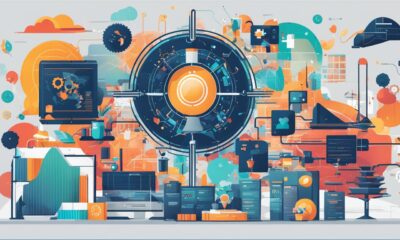
 AI in Business3 weeks ago
AI in Business3 weeks agoAI: The Powerhouse Driving Tomorrow’s Industries
-

 AI in Legal3 weeks ago
AI in Legal3 weeks agoPredictive Justice: AI’s Role in Shaping Legal Outcomes
-

 AI Entertainment2 months ago
AI Entertainment2 months agoOpenAI Releases SORA: Breakthrough AI Platform
-

 AGI and AI Impact on Human Relationships2 months ago
AGI and AI Impact on Human Relationships2 months agoAI’s Influence on Society: Insights & Outlook
